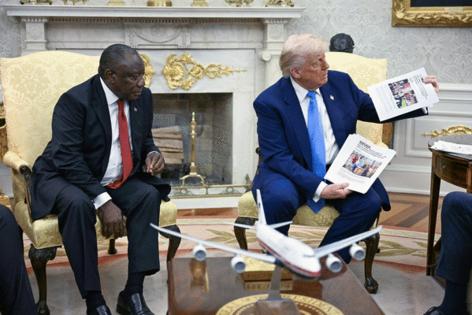House panel approves bill to reevaluate ties with South Africa
Published in News & Features
WASHINGTON — The House Foreign Affairs Committee on Tuesday advanced legislation that would order a comprehensive review of bilateral relations with South Africa in support of the Trump administration’s efforts to retaliate against Cape Town for its recent actions related to Israel and South Africa’s broader policy of nonalignment in the deepening competition over global influence.
The panel approved a dozen bills, some with overwhelming bipartisan support, including one to bolster trilateral cooperation between the elected legislatures of South Korea, Japan and the United States, which advanced in a 47-3 vote. Others were more contentious and garnered narrower margins, such as the South Africa legislation, approved as amended 34-16.
That bill, sponsored by Rep. Ronny Jackson, R-Texas, would order an assessment of whether any South African government officials and members of the Black-majority African National Congress — the political party that has dominated the country’s government since its first post-apartheid elections in 1994 — should be sanctioned under U.S. anti-corruption laws.
Republicans are angry at South Africa for bringing a genocide case at the U.N. International Court of Justice against Israel for its wartime policies in the Gaza Strip.
“Recently, South Africa has abandoned America and our allies and increasingly aligned itself with our adversaries,” said Jackson.
Democrats criticized the bill as counterproductive to efforts to woo South Africa away from adversaries like China and Russia. They said the legislation omits important aspects in U.S.-South Africa relations, such as Washington’s longtime refusal, until the 1980s, to sanction the apartheid-era government in South Africa.
White South Africans, known as Afrikaners, comprise roughly 7 percent of the population but own some three-quarters of the nation’s farmland. The ethnic group has remained the most economically privileged in the country three decades after the end of apartheid.
Democrats at the markup argued that the administration’s decision to grant Afrikaners blanket refugee status makes a mockery of the U.S. refugee resettlement program, particularly while other asylum-seekers from Haiti, Venezuela, Central America, Afghanistan and elsewhere face expulsion.
“The United States is welcoming white Afrikaners from South Africa, many of whom will tell you they neither need or want refugee status, while we actively turn away people from war-torn countries and those escaping extreme human rights abuses and political violence,” said House Foreign Affairs ranking member Gregory W. Meeks, D-N.Y.
He cited President Donald Trump’s public dressing down in May of South African President Cyril Ramaphosa during an Oval Office visit that included false claims by Trump about murders of white South African farmers.
Meeks called GOP support for the administration’s actions a “glaring hypocrisy.”
“When we disagree with our partners, including on the continent of Africa, we should handle that responsibly by diplomacy and by presenting convincing arguments,” Meeks said.
Arms sales to certain Arab countries
The panel approved, 31-19, as amended, a measure to mandate expedited processing of U.S. arms sales for Arab countries that have normalized relations with Israel under the Abraham Accords and to shrink the timeline of congressional oversight for those sales from 30 days to 15 days.
“In addition to the tangible benefits of this shorter time period, there is also great symbolism,” said sponsor Mike Lawler, R-N.Y. “We are showing our Middle East partners that we’re serious about deepening security ties.”
Democrats argued it was unwise to principally base decisions on exporting advanced weapons to a nation on whether it recognizes Israel. They pointed to the examples of Egypt and the United Arab Emirates, Arab states that have normalized ties with Israel but have poor human rights records and, in the case of Cairo, a recent history of toppled governments via popular uprisings and military coup.
Rep. Brad Sherman, D-Calif., said it was foolhardy to believe an agreement struck with one government to recognize Israel might not be overturned in a regime change.
“If the government speaks for the people of a country, then you expect that governmental decision to stick,” Sherman said, noting how when a popular revolution toppled the shah of Iran in 1978, all the U.S.-supplied weapons previously transferred to a formerly U.S.-aligned Tehran were now in the hands of avowed adversaries. “If the government is nondemocratic, then when that government is gone, the deal is gone.”
©2025 CQ-Roll Call, Inc., All Rights Reserved. Visit cqrollcall.com. Distributed by Tribune Content Agency, LLC.







Comments